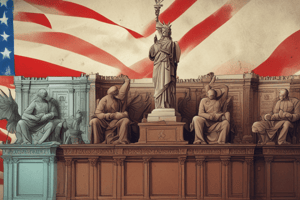Podcast
Questions and Answers
What are inherent powers?
What are inherent powers?
- Powers explicitly spelled out in the Constitution
- Powers only state governments can exercise
- Powers that can be implied from express grants (correct)
- Powers that Congress does not have
What are delegated powers?
What are delegated powers?
Powers specifically outlined in the U.S. Constitution.
What are exclusive powers?
What are exclusive powers?
Powers that can only be exercised by the Federal Parliament.
What are expressed powers?
What are expressed powers?
What are reserved powers?
What are reserved powers?
What are denied powers?
What are denied powers?
What are implied powers?
What are implied powers?
What are concurrent powers?
What are concurrent powers?
What is an interstate compact?
What is an interstate compact?
What is the Full Faith & Credit clause?
What is the Full Faith & Credit clause?
What does the Privileges & Immunities clause do?
What does the Privileges & Immunities clause do?
Define extradition.
Define extradition.
What is the Defense of Marriage Act (DOMA)?
What is the Defense of Marriage Act (DOMA)?
What does the term 'Supreme Law' refer to?
What does the term 'Supreme Law' refer to?
What is the Supreme Court?
What is the Supreme Court?
What was the outcome of McCulloch v. Maryland?
What was the outcome of McCulloch v. Maryland?
What does the 10th Amendment state?
What does the 10th Amendment state?
Define federalism.
Define federalism.
What is Article IV about?
What is Article IV about?
What is the Pledge of Allegiance?
What is the Pledge of Allegiance?
Flashcards are hidden until you start studying
Study Notes
Inherent Powers
- Inherent powers extend beyond what's explicitly defined in the Constitution, allowing for implied governmental authority.
Delegated Powers
- Delegated powers are specifically outlined in the U.S. Constitution, defining Congress's regulatory scope and limitations.
Exclusive Powers
- Exclusive powers can only be exercised by the Federal Parliament and are listed in the Constitution.
Expressed Powers
- Expressed powers are those explicitly listed in the Constitution for Congress to exercise.
Reserved Powers
- Reserved powers are retained by the states, not granted to the national government by the Constitution.
Denied Powers
- Denied powers are prohibited to both national and state governments as outlined in the Constitution.
Implied Powers
- Implied powers are derived from express powers, enabling Congress to perform necessary functions that aren't specified.
Concurrent Powers
- Concurrent powers are shared between national and state governments, allowing for overlapping authority.
Interstate Compact
- An interstate compact is a formal agreement between states, or between a state and a foreign entity, requiring Congressional consent.
Full Faith & Credit
- The Full Faith and Credit Clause mandates that states recognize and uphold the public acts, records, and judicial proceedings of other states.
Privileges & Immunities
- The Privileges and Immunities Clause ensures citizens of each state receive most privileges granted to citizens of other states.
Extradition
- Extradition is the legal process for returning fugitives to their state of origin for justice.
Defense of Marriage Act (DOMA)
- Enacted in 1996, DOMA stated that states are not required to recognize same-sex marriages sanctioned in other states, defining marriage in heterosexual terms for federal purposes.
Supreme Law
- The Supreme Law comprises fundamental rules guiding government actions and citizen behavior.
Supreme Court
- The Supreme Court serves as the highest judicial authority in a country or state.
McCulloch v. Maryland
- This landmark Supreme Court case established the legality of a national bank, affirmed the "Necessary and Proper" Clause, and reinforced that federal law is supreme over state law.
10th Amendment
- The Tenth Amendment articulates federalism by reserving powers not explicitly granted to the federal government to the states or the people.
Federalism
- Federalism is a governance structure where power is divided between federal and state authorities.
Article IV
- Article IV of the Constitution identifies the Supremacy Clause, establishing the federal authority over state laws.
Pledge of Allegiance
- The Pledge of Allegiance is a promise by U.S. citizens to be loyal to their flag and the values it represents.
Studying That Suits You
Use AI to generate personalized quizzes and flashcards to suit your learning preferences.




